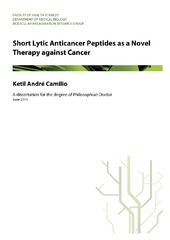| dc.contributor.advisor | Sveinbjørnsson, Baldur | |
| dc.contributor.author | Camilio, Ketil André | |
| dc.date.accessioned | 2013-11-11T11:37:29Z | |
| dc.date.available | 2013-11-11T11:37:29Z | |
| dc.date.issued | 2013-09-06 | |
| dc.description.abstract | Cancer is the leading cause of deaths worldwide, with a significant increase in the number of annual incidents. Concurrently, cancer-related therapy has been met with a number of challenges, such as toxic side effects and an increase in multi-drug resistant cancer cells, thereby spawning a need for new and improved therapies. Cationic antimicrobial peptides (CAPs) are naturally occurring molecules found in most species, often as an integral part of the first line of defense against pathogens. Several CAPs have shown promising potential as novel anticancer agents with an ability to selectively kill cancer cells.
Structure-activity relationship studies on bovine lactoferricin allowed us to de novo design short chemically modified lytic anticancer peptides (ACPs) with an improved therapeutic potential compared to bovine lactoferricin. The intratumoral (i.t.) administration of LTX-302 induced a complete regression of- and a long-term and transferrable tumor-specific immune protection against syngeneic A20 B cell lymphomas. A more active nonapeptide, LTX-315, was able to induce complete regression and a long-term tumor immune protection against highly aggressive and low immunogenic syngeneic B16 melanomas. By inducing rapid necrosis and local inflammation due to the release of Danger-Associated Molecular Pattern molecules, i.t. administration of the ACPs stimulated the infiltration of immune cells into the tumor parenchyma, thus creating a synergistic relationship between the direct disruptive effects and the indirect immunomodulatory effects of the peptides.
This thesis also demonstrates that ACPs with a high cell membrane disruptive potential such as LTX-315 can be used in an immune augmenting adjuvant setting due to its potential to stimulate immune responses. Intradermal administration of LTX-315 induced reversible tissue damage, leading to local inflammation and the infiltration of immune cells at the injection site. When used together with a tumor cell lysate, the combination was able to mount a long-term tumor immune protection against syngeneic B16 melanomas.
Taken together, the data presented in this thesis demonstrates that i.t. treatment with short lytic LTX-ACPs can have potential as new immunotherapeutic agents by enlisting local tumor control, followed by protective immune responses. Moreover, LTX-315 has an immune augmenting adjuvant potential when used in combination with a whole cell cancer vaccine. | en |
| dc.description.doctoraltype | ph.d. | en |
| dc.description.popularabstract | Nåværende kreftbehandlinger har en rekke utfordringer, slik som bivirkninger og en økning i behandlingsresistente kreftceller. Kationiske antimikrobielle peptider er naturlige molekyler som finnes i de fleste arter, og flere av disse har vist et lovende potensial som en ny terapi mot kreft, på grunn av deres evne til å selektivt drepe kreftceller. Struktur-aktivitetsstudier på et naturlig forsvarspeptid, bovin laktoferricin, gjorde at vår gruppe kunne designe små lytiske antikreftpeptider. Lokal behandling med disse peptidene førte til komplett regresjon av etablerte A20 B celle lymfom- og B16 melanomtumorer i dyr. I tillegg viste det seg at veldig potente antikreftpeptider kan ha et potensiale som en adjuvans, og kan dermed øke effekten av kreftvaksiner. Dermed kan små lytiske antikreftpeptider muligens brukes innen immunterapi ved å virke lokalt mot kreften, fulgt av beskyttende immunresponser. | en |
| dc.description.sponsorship | The Research Council of Norway and Lytix Biopharma AS | en |
| dc.description | The papers of this thesis are not available in Munin: <br/>1. Gerd Berge, Liv Tone Eliassen, Ketil Andre Camilio, Kristian Bartnes, Baldur Sveinbjørnsson and Øystein Rekdal: 'Therapeutic vaccination against a murine lymphoma by intratumoral injection of a cationic anticancer peptide', Cancer Immunol Immunother (2010), vol.59(8):1285-94, available at <a href=http://dx.doi.org/10.1007/s00262-010-0857-6>http://dx.doi.org/10.1007/s00262-010-0857-6</a>
<br/>2. Ketil André Camilio, Gerd Berge, Chandra Sekhar Ravuri, Øystein Rekdal and Baldur Sveinbjørnsson: 'Complete Regression and Protective Immune Responses obtained in B16 Melanomas after Treatment with LTX-315' (manuscript). Later published in <a href=http://dx.doi.org/10.1007/s00262-014-1540-0>Cancer Immunol Immunother (2014) 63:601–613</a>
<br/>3. Gerd Berge, Ketil André Camilio, Øystein Rekdal and Ali Areffard: 'Long-term Protection against B16 Melanomas upon Vaccination with Tumor Cell Lysate in Combination with LTX-315 as a Novel Adjuvant' (manuscript) | en |
| dc.identifier.uri | https://hdl.handle.net/10037/5489 | |
| dc.identifier.urn | URN:NBN:no-uit_munin_5190 | |
| dc.language.iso | eng | en |
| dc.publisher | University of Tromsø | en |
| dc.publisher | Universitetet i Tromsø | en |
| dc.rights.accessRights | openAccess | |
| dc.rights.holder | Copyright 2013 The Author(s) | |
| dc.subject.courseID | DOKTOR-003 | en |
| dc.subject | VDP::Medical disciplines: 700::Basic medical, dental and veterinary science disciplines: 710::Medical immunology: 716 | en |
| dc.subject | VDP::Medisinske Fag: 700::Basale medisinske, odontologiske og veterinærmedisinske fag: 710::Medisinsk immunologi: 716 | en |
| dc.title | Short Lytic Anticancer Peptides as a Novel Therapy against Cancer | en |
| dc.type | Doctoral thesis | en |
| dc.type | Doktorgradsavhandling | en |


 English
English norsk
norsk